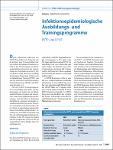Infektionsepidemiologische Ausbildungs- und Trainingsprogramme FETP und EPIET
Bremer, Viviane
Das deutsche Field Epidemiology Training Pro gramme (FETP) und das europäische European Programme for Intervention Epidemiology Training (EPIET) wurden gegründet, um ein Netzwerk von Epidemiologen für die Überwachung und Kontrolle von Infektionskrankheiten auszubilden. Innerhalb von 2 Jahren müssen die Trainees am Robert Koch-Institut oder an europäischen Gastinstituten Ausbruchsuntersuchungen, Surveillance- und Forschungsprojekte durchführen und die Ergebnisse veröffentlichen. Seit 1995 haben 22 FETP und 94 EPIET-Trainees zahlreiche Ausbruchsuntersuchungen, Surveillance- und Forschungsprojekte zu Erregern von z. B. Salmonellosen, der Influenza, SARS und Vogelgrippe durchgeführt und veröffentlicht. Zurzeit sind 70% der FETP- und EPIET-Absolventen auf regionaler, nationaler oder internationaler Ebene in Schlüsselpositionen der Infektionskontrolle tätig. So wohl das deutsche FETP- als auch das europäische EPIET-Programm bieten eine hochwertige, praxisnahe Ausbildung in angewandter Epidemiologie. Die Erfahrung der Absolventen wird in das neue European Centre for Disease Prevention and Control (ECDC) einfließen und die zukünftige Richtung der Infektionsepidemiologie in Deutschland und Europa bestimmen. The German Field Epidemiology Training Programme (FETP) and the European Programme for Intervention Epidemiology Training (EPIET) were founded to develop a network of epidemiologists for the surveillance and control of communicable diseases. During their 2-year training, FETP or EPIET fellows are based at the Robert Koch-Institut or other European host institutes and have to conduct outbreak investigations, carry out surveillance and research projects and publish the results. Since 1995, all 22 FETP and 94 EPIET fellows have conducted and published numerous outbreak investigations, surveillance and research projects, for example on pathogens inducing salmonellosis, influenza, SARS or avian influenza. Currently, 70% of FETP and EPIET alumni are working in key positions in communicable disease control on a regional, national or international level. The German FETP and the European EPIET programme offer high quality practical training in applied epidemiology. The expert knowledge of the alumni of both training programmes will be incorporated into the new European Centre for Disease Control (ECDC) and determine the future direction of infectious disease epidemiology in Germany and Europe.
No license information

